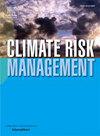哥伦比亚中部农民对气候变化的认知:基于保护动机理论和心理距离的倾向得分匹配方法
IF 5
2区 环境科学与生态学
Q1 ENVIRONMENTAL SCIENCES
引用次数: 0
摘要
本研究调查了哥伦比亚中部农民遭遇极端天气事件(特别是山体滑坡和干旱)的经历如何影响他们对气候变化的看法,以及这些事件对气候风险管理的影响。利用保护动机理论和心理距离作为框架,我们在2022-2023年对360名农民进行了调查,以评估他们对气候变化严重性、脆弱性和接近性的看法。为了控制混杂因素,我们采用倾向得分匹配,比较受滑坡和干旱影响的村庄的农民与未受影响的村庄的农民。我们的研究结果表明,虽然山体滑坡不会显著改变农民的认知,但干旱会提高农民对气候变化的认识,在16个认知类别中,有10个类别存在统计学上的显著差异。这表明,极端天气事件的性质在形成对气候变化的看法方面起着至关重要的作用。值得注意的是,受干旱影响的农民认为气候变化更严重,感觉更脆弱,与受滑坡影响地区的农民相比,他们对其影响的心理距离更近。这些结果表明,气候风险管理策略应该针对影响一个地区的特定类型的极端天气事件进行调整。此外,通过比较干旱和滑坡事件,本研究提供了新的见解,了解不同的气候冲击如何影响农民的看法,有助于更细致入微地了解气候变化适应。这项研究强调了倾向得分匹配,通过更好地平衡群体和减少混杂的偏差,在气候感知研究中提供了一种优于传统方法的方法。本文章由计算机程序翻译,如有差异,请以英文原文为准。
Farmers’ climate change perceptions in central Colombia: A propensity score matching approach using protection motivation theory and psychological distance
This study investigates how farmers’ experiences with extreme weather events, specifically landslides and droughts, shape their perceptions of climate change in central Colombia, and their implications for climate risk management. Using Protection Motivation Theory and psychological distance as frameworks, we surveyed 360 farmers in 2022–2023 to assess their perceptions of climate change severity, vulnerability, and proximity. To control for confounding factors, we employed propensity score matching, comparing farmers in villages affected by landslides and droughts with those in unaffected villages. Our findings reveal that while landslides do not significantly alter farmers’ perceptions, droughts heighten awareness of climate change, with statistically significant differences observed in 10 out of 16 perception categories. This suggests that the nature of extreme weather events plays a crucial role in shaping climate change perceptions. Notably, farmers affected by drought perceive climate change as more severe, feel more vulnerable, and report closer psychological distance to its impacts compared to those in landslide-affected areas. These results imply that climate risk management strategies should be tailored to the specific types of extreme weather events affecting a region. Furthermore, by comparing drought and landslide events, this study provides new insight into how different climatic shocks shape farmers’ perceptions, contributing to a more nuanced understanding of climate change adaptation. This research highlights how propensity score matching, by better balancing groups and reducing bias from confounding, offers a methodological improvement over conventional approaches in climate perception studies.
求助全文
通过发布文献求助,成功后即可免费获取论文全文。
去求助
来源期刊

Climate Risk Management
Earth and Planetary Sciences-Atmospheric Science
CiteScore
8.20
自引率
4.50%
发文量
76
审稿时长
30 weeks
期刊介绍:
Climate Risk Management publishes original scientific contributions, state-of-the-art reviews and reports of practical experience on the use of knowledge and information regarding the consequences of climate variability and climate change in decision and policy making on climate change responses from the near- to long-term.
The concept of climate risk management refers to activities and methods that are used by individuals, organizations, and institutions to facilitate climate-resilient decision-making. Its objective is to promote sustainable development by maximizing the beneficial impacts of climate change responses and minimizing negative impacts across the full spectrum of geographies and sectors that are potentially affected by the changing climate.
 求助内容:
求助内容: 应助结果提醒方式:
应助结果提醒方式:


